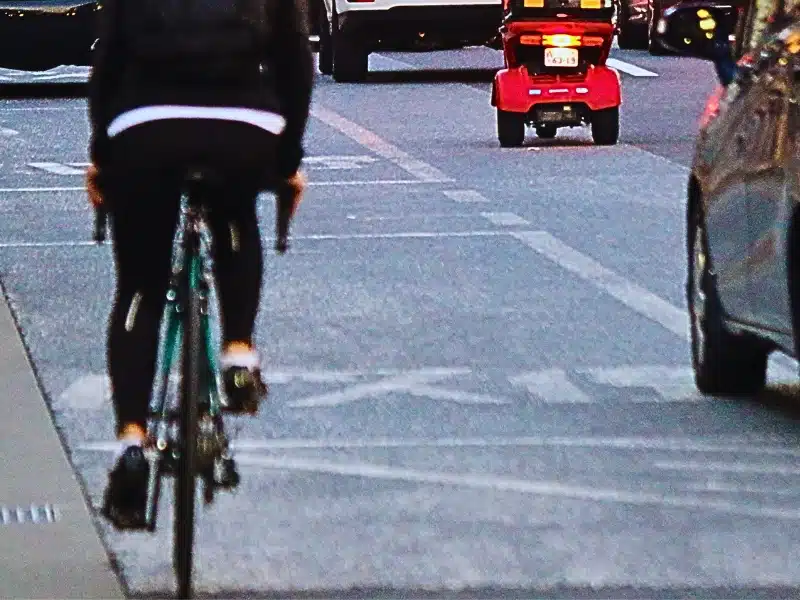Unsafe Passing Accidents: What Happens When Cars Don’t Give Cyclists Enough Space

When cars don’t give cyclists enough space when overtaking, they can cause accidents that could lead to severe injuries or fatalities for the cyclists. Passing too closely could lead to the cyclist being hit directly, losing control, or swerving. Most states have laws requiring drivers to maintain a safe distance when overtaking cyclists, and failure to do so could lead to legal liability if an accident occurs.
Table of Contents

If you were involved in an unsafe passing accident, the Chicago bicycle accident lawyers at DePaolo Zadeikis & Pino, LLC, are here to help. Call 312-263-7560 for a free consultation.
When Drivers Overtake Cyclists: What Counts as Unsafe Passing?
Unsafe passing occurs when drivers pass too close to cyclists while overtaking, without leaving the legally defined minimum required space between the vehicle and the bicycle. The state laws governing the minimum passing distance required vary.
Chicago has a 3-foot law for passing bicycles. Most states, including Illinois, enforce a three-foot passing law. According to the League of American Bicyclists’ 2024 Bicycle Friendly State Report, Illinois ranks 11th. A few states have general laws that require motorists to maintain a safe distance when overtaking cyclists, without specifying a precise passing distance.
Failure to give cyclists space when passing increases the risk of a bicycle accident. It is also a traffic violation.
Illinois’s Safe Passing Law and How It Protects Cyclists
Illinois has a three-foot safe passing law that requires drivers to leave at least three feet of clearance when overtaking a cyclist on the road. This law aims to reduce bicycle accidents caused by vehicles passing too closely, which can destabilize cyclists or result in contact with vehicle parts such as mirrors.
Illinois’s Passing Laws
Under Illinois law, motorists must leave a minimum of three feet between their vehicle and a bicycle when passing and must maintain that clearance until they have safely overtaken the cyclist. Drivers may cross a double yellow line, when it is safe to do so, to provide the required distance. The law also prohibits drivers from intentionally interfering with or endangering a person riding a bicycle on the roadway. If multiple lanes are available in the same direction, drivers are encouraged to change lanes entirely when passing cyclists to ensure maximum safety.
How These Laws Protect Cyclists
Illinois’s safe passing law helps prevent sideswipe collisions and other close-call incidents. When a vehicle passes too closely, a mirror or door can easily strike a cyclist’s handlebars or arm, leading to severe crashes. Studies have shown that states with defined safe passing laws experience fewer bicycle accidents than those without them.
The three-foot buffer provides cyclists with essential space to maneuver around road hazards, such as potholes, debris, or suddenly opened car doors, without veering into traffic. This extra room also reduces the effects of air turbulence caused by fast-moving vehicles in the worst traffic conditions, helping cyclists maintain balance and control.
Illinois’s safe passing requirements also provide an important legal foundation for cyclists injured in unsafe passing incidents to seek justice. An experienced Illinois bicycle accident lawyer can help injured riders pursue compensation and hold negligent drivers accountable.
Who Is Liable When a Driver Fails to Leave Enough Space for a Cyclist?
When a driver violates safe passing laws and causes an accident, the driver could be held liable for resulting bicycle and e-bike injuries. The driver can be held responsible for the injured cyclist’s medical expenses, lost wages, lost earning capacity, property damage, pain and suffering, and other accident-related damages.
Depending on the details of your crash, you may be able to pursue a claim against other liable parties. If the driver was on the clock at the time of the unsafe passing bicycle accident, the driver’s employer could also be held liable for the driver’s negligence. If you were injured by a drunk driver, the local establishment that served the at-fault driver alcohol before he or she got behind the wheel could be liable for your injuries under Illinois’ Dram Shop laws. Local or state governments and construction companies may also be liable if poor road design, potholes, and other hazardous conditions contribute to a bicycle accident on dangerous roads.
An experienced bicycle accident lawyer can help you identify all the liable parties, collect comprehensive evidence, and deal with insurance companies to ensure you seek the maximum compensation possible for your injury-related losses. DePaolo Zadeikis & Pino, LLC, bicycle accident attorneys have decades of experience handling injury cases in Chicago. Contact us to get started with a free consultation.
Frequently Asked Questions About Bicycle-Car Accidents
How Much Space Must Drivers Give Cyclists Under Illinois Law?
Under Illinois law, drivers must maintain a distance of at least three feet when overtaking cyclists.
Can I File a Claim If a Driver Sideswiped Me While Passing Too Closely?
You can file a claim against a driver who sideswiped you while passing too closely. Hitting a cyclist while passing in an unsafe way is considered negligence. Cyclists can make a claim for their injuries and damages against negligent drivers.
What Evidence Helps Prove Unsafe Passing Caused a Bicycle Accident?
Evidence like bike-mounted camera footage, traffic camera footage, vehicle data, witness statements, police reports, crash scene photos, and expert testimony can help prove that a bicycle accident was caused by unsafe passing. Evidence can disappear quickly, so having a bicycle accident lawyer gather and preserve evidence as soon as possible after your crash is critical.



